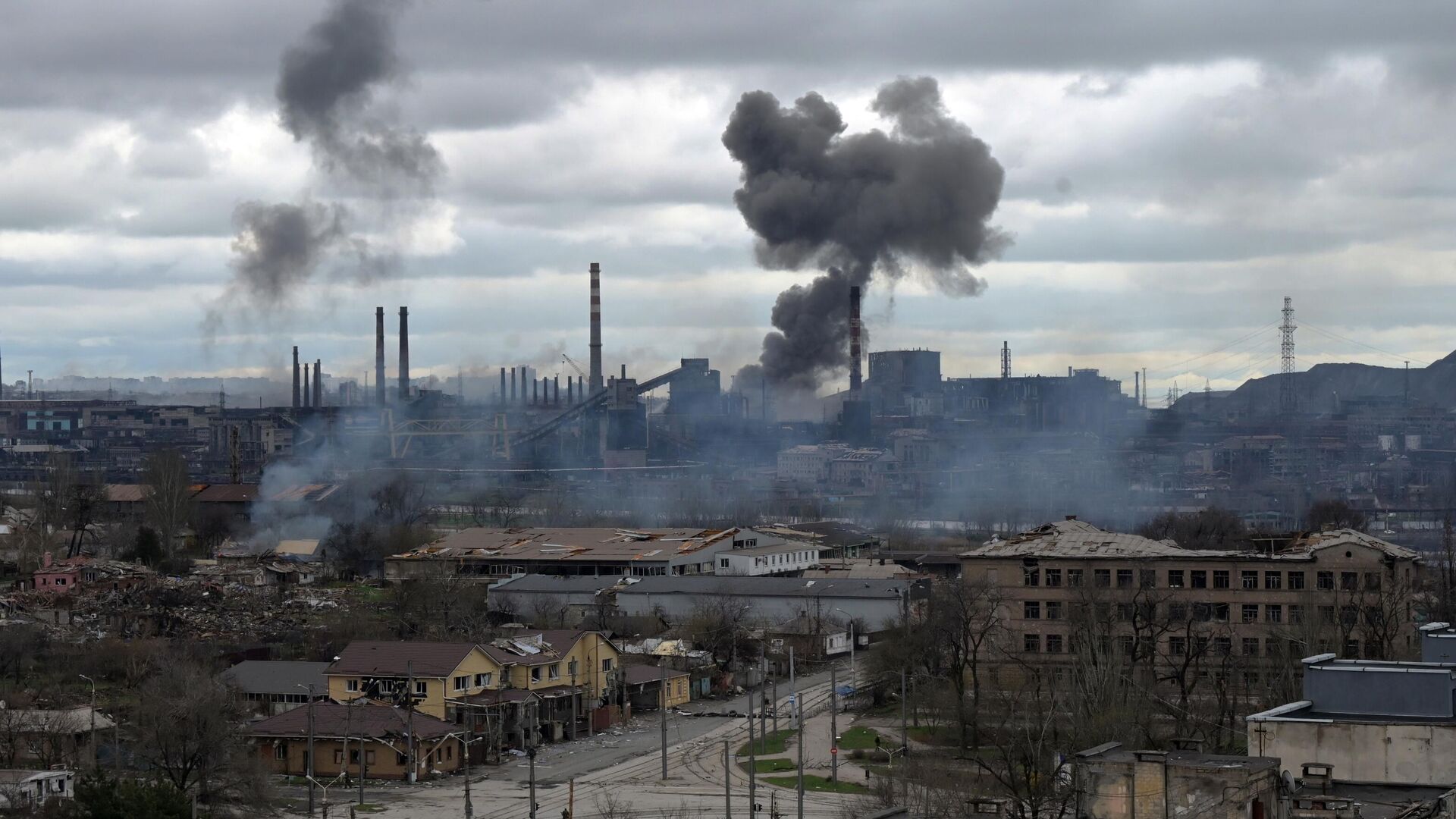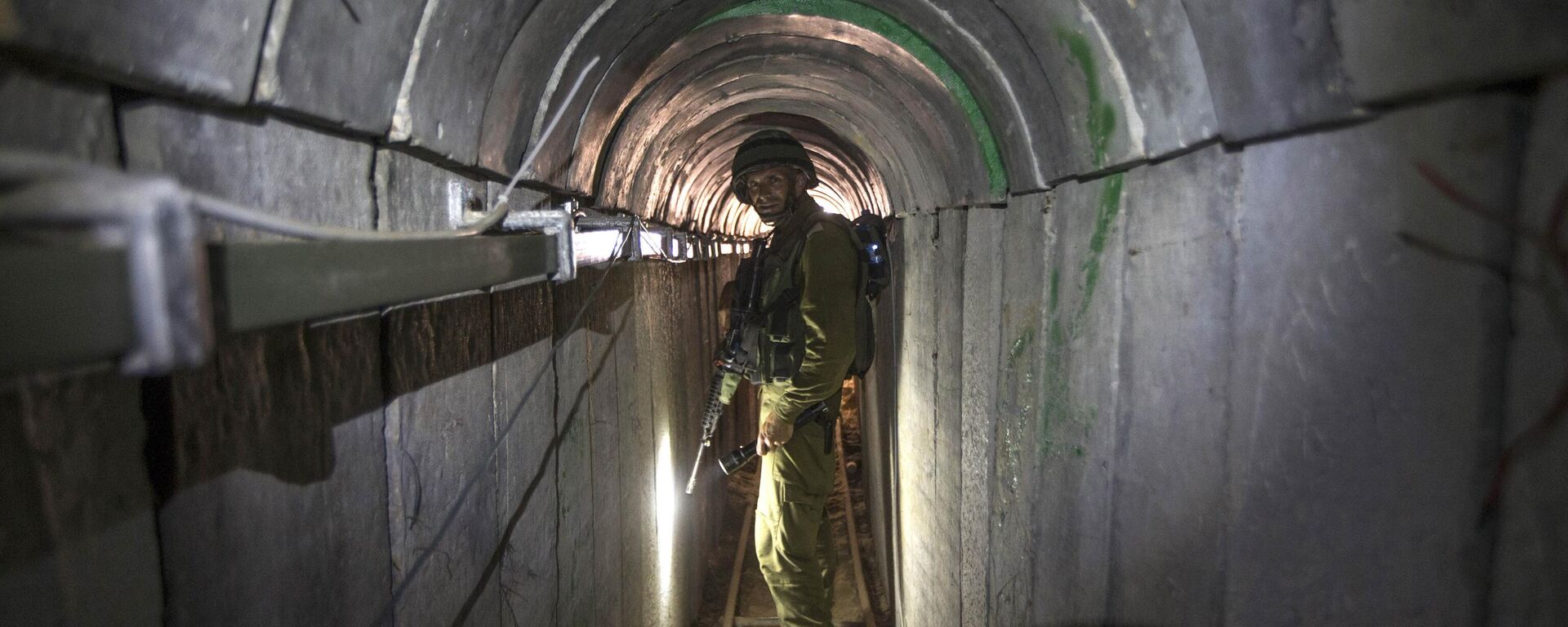IDF Must 'Moderate Expectations' of Gaza Op, Prepare for Long Urban Warfare
18:15 GMT 31.10.2023 (Updated: 09:23 GMT 05.12.2023)

© Sputnik / Ilya Pitalev
/ Subscribe
While there are some comparisons between recent urban conflicts and the Israeli assault on Gaza, a number of unique circumstances exist in the Palestinian enclave that could make any kind of Israeli victory impossible, a former US military officer told Sputnik.
As Israeli ground forces severed all communications into and out of the Gaza Strip and launched a massive assault late last week, Prime Minister Benjamin Netanyahu has declared a “third stage” of the war with Hamas.
Israel declared a state of war to exist on October 7, when militants from inside the Gaza Strip broke through the Israeli border fence and attacked several nearby settlements, killing more than 1,400 Israelis. In response, the Israeli Defense Forces (IDF) declared a “complete siege” of Gaza, cutting off electricity, fuel, and water to the enclave of more than 2 million Palestinians.
During the nonstop IDF bombardment since then, nearly 9,000 people have been killed in Gaza, including more than 3,000 children, and the acute shortages of other basic goods threaten the lives of thousands more. Hamas’ offers to release more than 200 Israelis captured during the October 7 raid in exchange for an end to the siege and the release of Palestinian prisoners held in Israel have been rebuffed.
Earl Rasmussen, an international consultant and retired US Army lieutenant colonel with over 20 years of military service, told Sputnik on Tuesday that while the IDF could learn a great deal from the experience of recent urban warfare battles (in the Iraqi cities of Fallujah and Mosul and the DPR city of Mariupol) the Gaza Strip presents a number of unique challenges as well, including the high level of support militant groups like Hamas enjoy among the population.
“The attack by Hamas was tragic. Let's be upfront on that. But I think Israel was overreacting. Already we have several more deaths, and the rate of deaths has been horrendous, basically, it's almost like an ethnic cleansing going on, in the Gaza area, of the Palestinians. And that's affecting both the Muslim and Christian and even, probably, Jewish populations that are from that region,” he said.
“I think Netanyahu initially just wanted to go in and exterminate Gaza and maybe just completely wipe the whole thing out. He says he wants to eliminate Hamas, I don't think it's a realistic thing,” Rasmussen said. “But the US is kind of tempering, [the Israelis] are getting a lot of pressure to be careful on the humanitarian side, civilian deaths, and so on. I think in the US government, a lot of people are trying to encourage a more targeted type of precision strikes and a targeted type of ground operation. So I think there's a little bit of adjustment that's occurring in their strategy other than just the blanket overwhelming invasion to more of relying on air superiority for precision and artillery strikes, and focusing more on a targeted invasion,” Rasmussen said.
“Hamas has become more sophisticated over time. I do not think it's going to be a quick military victory for Israel, or maybe they won't even obtain a victory. It's a shifting area, I think is going to be probably adjusting, probably looking at prior experiences of Fallujah, Mosul, Mariupol - Mariupol has a very parallel look at this, with the tunnels and everything. I think the strategy by Israel is going to continue to evolve based on the situation.”
Rasmussen said the battles in cities in Iraq and Ukraine were valuable to study in the context of the Gaza Strip invasion because “it provides you a framework for basically urban conflict.”
“But the distinct difference here is that you're going into Gaza, which is probably one of the densest populated areas there is in the world, and you've got a huge network of tunnels underneath, and Hamas - I mean, this is their land, their intent to hold it and to fight is can't be underestimated. I think their training is better, they're more equipped, more organized. Also, they've implemented a new drone [strategy], so they have some air type of capability, both from an intelligence gathering as far as a strike capability.”
“Although there's similarities, there's big differences as well, both on how the structure and the ground operation can take place, as well as the capabilities of Hamas are more sophisticated and advanced than ISIS* was. I really think there's probably more of a similarity to the battle in Mariupol than that even to Fallujah or Mosul,” Rasmussen observed.
He noted that another issue is the question of how supportive the local population is of the fighters.
“In Iraq, we had a lot of Iraqis who were providing insight, intelligence information, you had people there probably were fighting not necessarily completely loyal to the IS. In this case, you've got a lot of Palestinians, and Hamas has been protecting and helping the Palestinians for a long time. Unlike Israel, that has not really assisted Palestinians at all. There are similarities, but it's much more different, it's going to be much more difficult. I think the casualty rate is going to be much higher. My understanding is there are at least 400,000 civilians still in the area, so you could have huge, huge civilian casualties as well. I think the battle is much more complex than we can even imagine right now.”
When it came to the question of “precision strikes” as the US is urging, or an all-out ground assault, as Jerusalem has desired, Rasmussen said “either one is going to be bad,” especially due to the huge tunnel networks underneath of Gaza.
“I think a massive frontal strike is going to level the entire area, but you still have the tunnel systems. I think they could have troops, they could have elements getting caught, and so they could get isolated. The precision strikes with the limited special forces operations would potentially limit the number of civilian casualties, or mitigate it at least, and they could kind of focus [on an] area, first, prep it more with air superiority, and then go into pockets with that.”
“The other side is - is that going to meet the objectives of what will happen with Hamas? I mean Hamas, they've learned from the lessons of previous conflicts as well. So just the flattening of it [Gaza] with a massive assault may not be - maybe it appears to be the best option to eliminate Hamas, but I don't think that's going to be successful.”
“The precision strikes with limited engagement with special operations - I don't know if that's going to be successful either. The benefits of that are going to be less casualties potentially,” he noted. “It may be better and more successful with urban fighting. A massive assault is going to be very difficult and they could get bogged down and have large portions of the units taking on injuries or destruction from Hamas, because Hamas knows the region. They're buried inside the tunnels. They can leverage their drone capabilities.”
Rasmussen said the IDF would need to understand that “fighting urban warfare, you're not just going to be able to go in and take it immediately, that it's going to be a long process. Perhaps looking at a siege type of capability. That it could be bloody and that you're literally going from building to building to building. It's not just a tank operation across the desert.”
He said the IDF would have to “moderate your expectations” and examine how Daesh or the Iraqi insurgent forces reacted at Mosul and Fallujah, respectively, to the assault on their city, and judge if Hamas is likely to react similarly.
*Daesh (also known as ISIS/ISIL/IS) is a terrorist organization outlawed in Russia and many other states.




